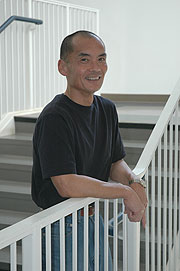April 24, 2006
Accountability measures and pressure to conform undermine professionalism of new teachers, expert says
By Jennifer McNulty
As if lesson planning and classroom management weren't challenging enough, new teachers today are experiencing a growing disconnect between their professional training and the increasingly prescribed way they are expected to do their jobs.

Rodney Ogawa is UCSC's Education Department chair.
Photo: Jennifer McNulty |
That's the focus of an article in the spring 2006 edition of Harvard Educational Review by Betty Achinstein, a researcher with the New Teacher Center, and Rodney Ogawa, professor and chair of the Education Department at the UCSC.
Strict state and federal accountability measures have inadvertently contributed to teacher attrition and diminished job satisfaction for many teachers, they write in the article, "(In)fidelity: What the Resistance of New Teachers Reveals about Professional Principles and Prescriptive Educational Policies."
"Districts are under such pressure to improve test scores that they're adopting policies that undermine the professionalism and independence of teachers," says Ogawa.
New teachers are particularly hard-hit by the clash of cultures, and children in underperforming school districts suffer the most, he says.
"Well-prepared new teachers may be initially drawn to districts with underserved populations, but they end up leaving out of frustration," explains Ogawa. "Underperforming districts often have to hire poorly prepared teachers who find solace and security in these scripted programs. It's not 'No child left behind,' it's 'Whole neighborhoods left behind.'"
Adopted to improve student achievement, accountability policies have prompted many school districts to mandate the use of specific instructional materials and curriculum plans. Such mandates contribute to the emergence of a "two-tier" educational system in which the most effective teachers gravitate toward higher-performing districts, says Ogawa. Higher student achievement levels give schools the leeway to offer teachers greater freedom, while struggling districts experience high rates of teacher turnover.
Teachers who resist prescribed methods experience tension, professional isolation, and sanctions up to and including job loss, according to the authors. Children in the most needy schools ultimately suffer as dedicated and energetic new teachers seek greater independence in other schools or leave the profession altogether, says Ogawa.
"Despite the pressure to execute prescribed programs, many new teachers feel they know what's best for their students," says Ogawa. "They adhere to their professional principles--particularly when it comes to reading, they want to offer a range of opportunities to meet individual needs--and when they're denied that flexibility, it can really be a difficult adjustment."
For example, many teachers, including novices, believe that strictly phonics-based reading materials may not be ideal for use with students whose native language is not English, says Ogawa. Yet many underperforming school districts with large numbers of English-language learners rely on phonics-based commercial products, forcing teachers to choose between their professional principles and school policy.
"The system really does grind up new teachers and spit them out," says Ogawa, who offers the following recommendations:
• Teacher organizations, including unions, need to offer career-spanning professional development opportunities.
• Teachers need opportunities to interact outside the school or district environment, in settings where they can support and encourage each other. Such extended networks can sustain alternative visions in the face of the status quo.
"We need to keep hope alive so when the policy tide turns, teachers will be prepared to step up," says Ogawa.
 Email this story
Email this story
 Printer-friendly version
Printer-friendly version
 Return to Front Page
Return to Front Page